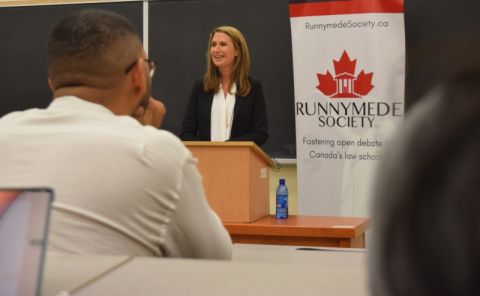
What is the role of free speech on college and university campuses? What is the best part of serving as Attorney General in Canada’s largest province?
On March 13, Queen’s Law welcomed the AG of Ontario herself, the Honourable Caroline Mulroney, as part of a Runnymede Society Queen’s discussion on judicial activism in the province.
Mulroney, who also serves as Ontario’s Minister of Francophone Affairs and Member of Provincial Parliament (MPP) for York-Simcoe, shared her observations with students on a variety of topics.
First, she articulated her views and those of her colleagues on the importance of free speech on college and university campuses.
“On both sides of the aisle, we as provincial parliamentarians value your participation in on-campus dialogue and debate, and driving the discussion on these important issues,” Mulroney told students. “Free speech is a critical component of a successful and robust democracy. Publicly-funded colleges and universities should be places where people exchange different ideas and opinions, even controversial ones, in an open, respectful debate.”
Regarding justice reform, Mulroney touted her government’s efforts to help victims of crime access services and assist individuals in resolving legal disputes more efficiently.
“We want certainty and transparency around investigations,” she said. “We’re also trying to strengthen the police oversight system, so that it will be more efficient, accountable and transparent. Beyond this, we’re making it easier for victims of crime to navigate the various services and supports that are available to them through the province of Ontario. We’re looking for ways to simplify the complex processes and technologies that seem to be a marquee of our justice system.”
On a lighter note, Mulroney shared a story of one of her most rewarding initiatives thus far as AG: appointing a judicial candidate deployed on an overseas mission.
“When I called his home, his wife told me that he was on a mission overseas and was not expected back for another six months,” she shared. “Once a judge has been appointed and approved by Cabinet, an appointee has to stop working. So the clock was on. It was like Saving Private Ryan. With the assistance of federal Defence Minister Harjit Sajjan, we tracked this man down. He hadn’t even told his parents yet that he was deployed. When I finally reached him, I said, ‘it’s my honour to appoint you.’ His wife and family were very excited, as was I.”
Robert Murphy, Law’20, was impressed with Mulroney’s responses at the event, and came away with a more nuanced view of an AG’s role within government.
“My main takeaway from hearing Caroline Mulroney speak is that an AG’s role is complex and multifaceted,” said Murphy. “Her observations on judicial independence were informative, non-partisan, honest and forthcoming. I think we are very lucky to have had a sitting AG come and speak to us, regardless of who the government of the day is.”
By Justin Murphy